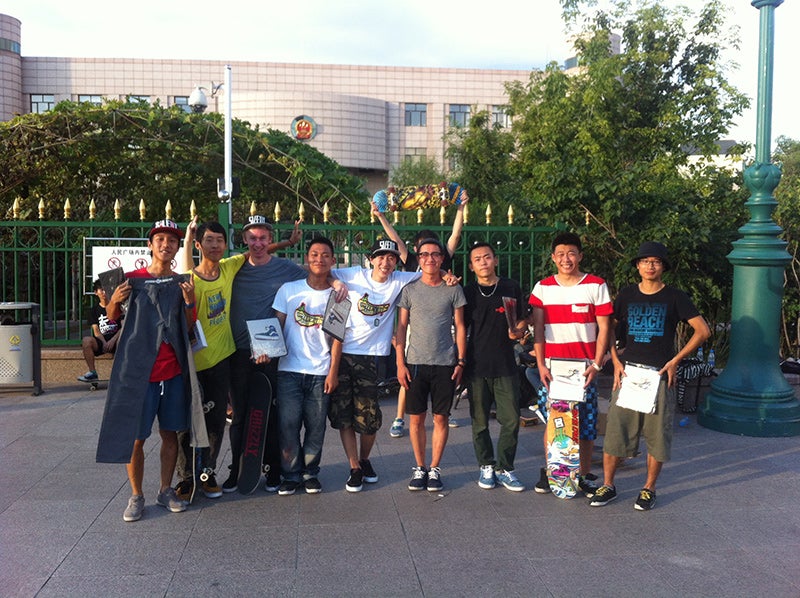 Note to students wanting to live and work—and skateboard—abroad: Trust your mother.
Note to students wanting to live and work—and skateboard—abroad: Trust your mother.
Erik Thorbeck did, and soon he’ll be off to China on a $20,000 scholarship program made possible by his dedication to learning Chinese. A junior with a double major in Planning, Public Policy and Management (PPPM) and Chinese, Thorbeck will use his David L. Boren Scholarship to study land use law and urban renewal in China from January to September 2015.
He began studying Chinese in middle school “because my mom thought it would be a good idea,” he says. “It was extremely hard at first but I trusted her and stuck with it. My passion developed for it after I got reasonably good at it.” With advanced language skills, when he was in China in 2013 “I was able to use [the language] to integrate myself into the local skateboarding community,” something he plans to do more of in 2015.
Entrée into local culture—with or without freestyle flips and slides—is part of the Boren Scholarship mission. The program provides up to $20,000 for undergraduate and graduate students to study less commonly taught languages in world regions critical to U.S. interests and underrepresented in study abroad programs. The awards focus on a broad definition of national security that includes challenges of global society, such as sustainable development, environmental issues, disease, migration, and economic competiveness—ideal for an A&AA student.
To prepare for the experience, Thorbeck worked summer 2014 for the Sustainable Cities Initiative with two visiting urban planners from China. He’ll continue the job through fall term.
“This has allowed me to use my language skills in Mandarin in a more professional and academic manner, which will prepare me well for what I will experience during my time in China,” he says. “Right now I'm just helping them with the basics of adjusting to life in the U.S. and Eugene. Later I'll help them understand and get somewhat involved with local planning, such as with the City of Eugene, or LCOG (Lane Council of Governments). I'll also be doing plenty of translation along the way.”
In China, Thorbeck will study at Nanjing University, in the city of Nanjing near Shanghai. “The classes I will take will focus on urban and regional planning and have relevance to what I have been studying in PPPM,” he says.

Above: Erik Thorbeck (third from left) and friends celebrate after a skateboarding competition in China. Photo courtesy Erik Thorbeck.
After the school term ends next spring, he hopes to intern in Chengdu, about 1,100 miles away in western China, during the summer. He independently arranged for the internship with the Chengdu Institute of Planning and Design, an urban planning institute that does work for the city government in Chengdu.
“I feel pretty lucky to have this opportunity to utilize language skills to explore PPPM-related concepts in a Chinese context,” he says. “International relations and national security have long been interests of mine. The service requirements of the Boren Scholarship opens doors to positions in these fields, and all recipients of this scholarship are required to work in a position of national security for at least one year after graduation.”
A 2012 graduate of the International School of Beaverton, a public magnet school in Beaverton, Oregon, Thorbeck says he has “always” been interested in design and accommodation of public spaces and parks in urban areas. Part of that stems from his “passion for action sports like skiing, skateboarding, and biking.”
Thorbeck first visited China in 2011 on a brief study and sightseeing trip. He returned summer 2013 for an intensive language program. His 2015 visit will offer new geography as well as experiences.
“I'm looking forward to getting to know a new city as well as a part of the country that I've never experienced before,” he says. “My internship will be in a different city than where I'll be taking classes, so I'm also excited for that.” He also hopes to get in some additional travel before and after classes, including a visit to friends in Taiwan.
And then there’s the skateboarding angle.
“What makes [China] great for skateboarding is the vastness of its public squares, which are an important part of largely populated areas,” he says. “Made mostly of marble and granite, these types of places are a natural skateboarding paradise. I absolutely plan to skateboard when I can between work and classes.”

Above: A skateboarder makes his way down a usually busy street in China. Skateparks in China are rare. Photo by Erik Thorbeck.
